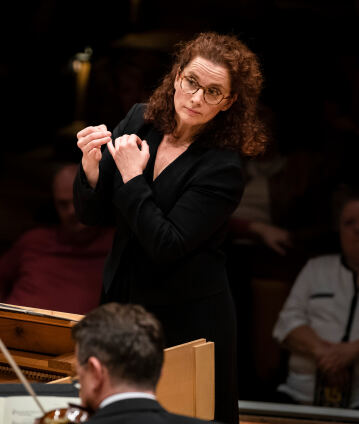Emmanuelle Haïm conducts Handel’s “Music for the Royal Fireworks”

In Handel’s famous Music for the Royal Fireworks, Baroque music shows its most magnificent side. In this concert, the work will be conducted by Emmanuelle Haïm, who in energetic performances repeatedly succeeds in “unleashing the wild and daring side of the Baroque” (The New York Times). The second part of the concert is dedicated to Handel’s cantata Apollo e Dafne – an early work that in sometimes highly virtuosic and enchantingly delicate arias reveals Handel’s interest in Italian opera.
Emmanuelle Haïm studied piano and organ at the Conservatoire in her native Paris until discovering for herself the harpsichord – and thus the world of early music. She won her first musical spurs as William Christie’s musical assistant and harpsichordist in his ensemble Les Arts Florissants. In 2000 she founded her own ensemble, Le Concert dʼAstrée, with which she has been holding guest performances around the world through the present day, repeatedly producing prize-winning recordings of works from the Baroque musical period. As a proven specialist in historical performance practice, Emmanuelle Haïm soon also conducted groups such as the Orchestra of the Age of Enlightenment, the City of Birmingham Symphony Orchestra, the Scottish Chamber Orchestra, the Deutsches Symphonie-Orchester Berlin and the hr-Sinfonieorchester in Frankfurt am Main.
Her collaboration with the Berliner Philharmoniker dates back to 2002: she was involved at that time in performances of Johann Sebastian Bach’s St John Passion, assisting Sir Simon Rattle as continuo player. Emmanuelle Haïm debuted as conductor of the Berliner Philharmoniker in 2008 with performances of Georg Friedrich Händel’s Ode for St. Cecilia’s Day. Three years later she conducted a Philharmonic concert programme with works by Händel and Jean-Philippe Rameau that resulted in an education project dedicated to the music of the French composer. Since then, Emmanuelle Haïm has time and again enriched the Berlin Philharmonic’s repertoire to include rarely played works, for instance Händel’s oratorio La resurrezione, which she performed in the Philharmonie in 2014.
Overall, Händel is a composer particularly close to the charismatic musician’s heart – not least because she, in her own words, particularly appreciates his unique feeling for the many-faceted possibilities of expression of the human voice. So it’s no wonder that for these Berliner Philharmoniker concerts Emmanuelle Haïm has programmed – besides Music for the Royal Fireworks, one of Händel’s perennial orchestral hits that premiered in 1749 – the cantata Apollo e Dafne, one of the composer’s rarely heard vocal compositions, completely under the spell of early 18th-century Italian opera. The concert kicks off with excerpts from Henry Purcell’s semi-opera The Fairy-Queen, based on William Shakespeare’s A Midsummer Night’s Dream, launched in London in 1692.
© 2019 Berlin Phil Media GmbH
Related interviews